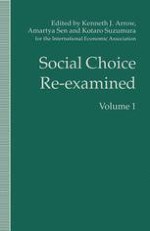1997 | OriginalPaper | Buchkapitel
The Possibility-Impossibility Boundary in Social Choice
verfasst von : Donald Campbell, Jerry Kelly
Erschienen in: Social Choice Re-examined
Verlag: Palgrave Macmillan UK
Enthalten in: Professional Book Archive
Aktivieren Sie unsere intelligente Suche, um passende Fachinhalte oder Patente zu finden.
Wählen Sie Textabschnitte aus um mit Künstlicher Intelligenz passenden Patente zu finden. powered by
Markieren Sie Textabschnitte, um KI-gestützt weitere passende Inhalte zu finden. powered by
Kenneth Arrow’s impossibility theorem (Arrow, 1950, 1951, 1963) was a landmark in the history of ideas. It created new branches of logic and social studies, and it spawned an enormous literature.2 It inspired other impossibility theorems which are themselves landmarks — most notably, Sen (1970a) — and, by teaching us how to formulate questions about the existence of decision-making mechanisms with specified properties, may claim the incentive theorems of Hurwicz (1972), Gibbard (1973) and Satterthwaite (1975) as offspring. Arrow’s theorem is extraordinarily robust, as forty years of social choice literature testifies. But it is time to turn from the production of impossibility theorems to the search for favourable trade-offs. In our view, a favourable trade-off is one that takes us far from dictatorship (or some other disastrous implication of a set of otherwise appealing axioms) without deviating much from the spirit of the criteria that we want reflected in the decision rule. We have taken some steps in this direction, and we highlight our own work on trade-offs in this paper. We have discovered that the prospects for favourable trade-offs are dim, except when one weakens Independence of Irrelevant Alternatives (IIA). Even a very small relaxation of IIA opens the door to rules that are far from dictatorial.
